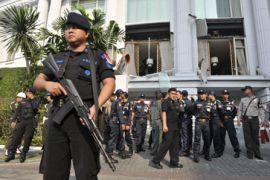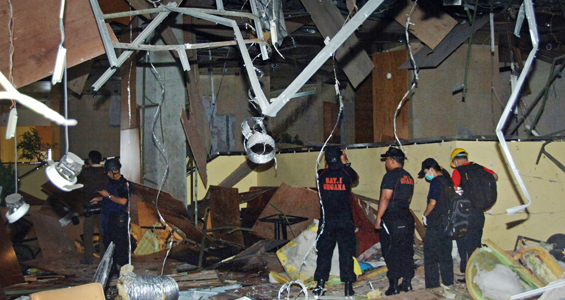Indonesia’s war on JI
Probe begins as suspicion falls on Jemaah Islamiyah for Indonesia hotel attacks.

 |
| The attacks at the Marriott and Ritz Carlton hotels in Jakarta killed nine people [AFP]. |
As investigations begin into who was behind Friday’s twin hotel bombings in Jakarta, many analysts are focusing attention on the Jemaah Islamiyah group (JI), blamed for carrying out a string of attacks across Indonesia against local and Western targets.
The following is a look at recent developments in Indonesia’s conflict with JI.
1999-2001: Bloody clashes between Muslims and Christians in eastern Indonesia kill 9,000 people and reportedly draw in al-Qaeda-linked fighters from the Middle East and Europe. Many Indonesian fighters go on to become members of JI.
October 2002: Simultaneous bomb attacks on Bali nightclubs leave 202 dead, mostly foreign tourists, including 88 Australians. Indonesian police say al-Qaeda helped fund the attacks, which was coordinated and carried out by JI.
October 2002: Indonesian police arrest Abu Bakar Bashir, a Muslim cleric and the alleged spiritual leader of JI. He is jailed for immigration violations, although the sentence is later reduced and he is released in 2005.
August 2003: Bomb outside the JW Marriott Hotel in Jakarta kills 11. Police say the attack was carried out by a JI suicide car bomber.
September-October 2003: Imam Samudra, convicted of masterminding the Bali bombings, and his accomplice Ali Ghufron, a fellow Afghan-trained fighter who bragged of his friendship with Osama bin Laden, are sentenced to death.
September 2004: Eleven people are killed and 200 wounded when a suicide truck bomber detonates a ton of explosives packed into a delivery van outside the Australian Embassy in Jakarta. Police say JI carried out the attack.
October 2005: Twenty people, mostly tourists, die in triple suicide attacks on beach restaurants on the island of Bali.
November 2005: JI bomb builder Azahari bin Husin is shot dead during a police raid on an alleged JI safehouse on Java island. The raid leads to arrests of several other JI suspects. Malaysian-born Noordin Top, alleged to be JI’s top bomb expert, appears on video soon after, threatening more attacks.
June 2007: Indonesian police arrest Abu Dujana, alleged to be a top JI commander, along with seven other suspected JI leaders in raids on Java.
November 8, 2008: After a series of appeals and stays of execution, Indonesia executes three men convicted of carrying out the 2002 Bali bombings.